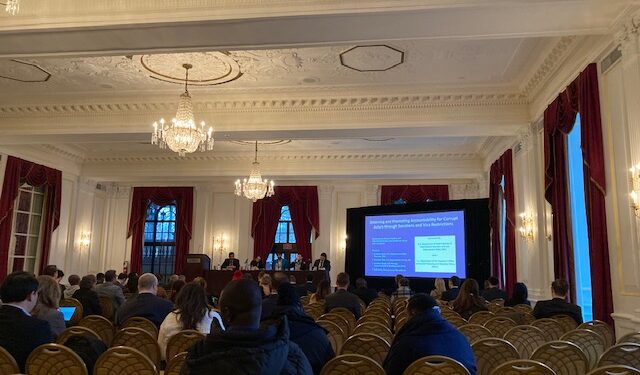WNN recently attended the 20th International Anti-Corruption Conference (IACC) in Washington, D.C. This year, the conference’s theme was “Uprooting Corruption, Defending Democratic Values.” In a panel coordinated by the U.S. Treasury Department and the U.S. State Department, a group of experts discussed sanctions and visa restrictions as a tool for fighting corruption.
The panel featured Jonathan Bhalla, Senior Governance Adviser at the Illicit Finance and Anti-Corruption Department of the U.K.’s Foreign, Commonwealth and Development Office, Christine Cline, the Division Chief of the U.S. Department of State/Bureau of International Narcotics and Law Enforcement, Richard Nephew, Coordinator on Global Anti-Corruption at the U.S. State Department, Jonathan Dixon, the Section Chief for Global Magnitsky of the U.S. Treasury Department’s Office of Foreign Assets Control, and Kush Amin, Legal Specialist/Advisor of Transparency International Secretariat.
The discussion’s name was “Deterring and Promoting Accountability for Corrupt Actors through Sanctions and Visa Restrictions.” Thus, the experts talked about using restrictions as tools for fighting corruption all over the world. Some participants talked about how there has been positive reception of these tactics from some members of the public and some governments that are committed to transparency. Panelists talked about how they’ve seen resignations and some criminal investigations come out of visa restrictions.
The experts also highlighted the importance of civil society organizations in fighting corruption. Amin said that some level of accountability “has a snowball effect” and that people feel encouraged when governments and entities take action against individuals engaged in corruption. He emphasized the importance of multilateralism in the fight against corruption and that sanctions should be considered just one tool in the toolbox.
Amin also said that the only way to discourage and prevent corrupt behavior is to have criminal consequences. Cline said that “accountability tools have an important role” and talked about her division’s work. Bhalla talked about how these tools – visa and sanctions restrictions – shouldn’t be used in isolation and instead used in conjunction with diplomacy, etc. Dixon discussed how a multilateral approach is always preferable and that if sanctions are the “stick,” you “have to provide some kind of carrot.” He also talked about working on a grassroots level on the ground in countries and also collaborating with civil society.
During the question and answer session, Dixon said that “the goal is behavior change,” meaning that the goal of putting someone on a sanctions list is to prompt them to change their behavior to then be taken off said list. Dixon also noted that dealing with corporations is a little different, since sometimes the corporations are being used as vehicles for corruption. Nephew said that there needs to be more mechanisms for more complex situations, like an arms dealer in one country that might have property or assets in other countries. Kush said that it’s impossible for every government to take action on everything, but it’s important for civil society organizations to act as a first stage or resource for people trying to fight corruption.
Critical Bill to Fighting Corruption Worldwide: Act Now!
The U.S. Congress is close to passing the most important anti-corruption legislation since the Dodd-Frank Act. On December 7, the U.S. Senate voted unanimously, 100-0, to pass the Anti-Money Laundering (AML) Whistleblower Improvement Act. The bill extends Dodd-Frank style whistleblower rights to individuals reporting money laundering and sanctions violations.
This bill is essential in holding Russian oligarchs accountable. By incentivizing whistleblowers, the bill will allow the U.S. to crack down on the money laundering and sanctions-busting schemes of Russian oligarchs. It is these illicit financial streams which are helping fund Putin’s war machine.
Currently, whistleblowers reporting sanctions violations are not protected under any U.S. whistleblower laws and money-laundering whistleblowers are not afforded the same rights as corporate whistleblowers. The AML Whistleblower Improvement Act addresses these current legislative shortcomings.
The House of Representatives is prepared to pass the bill. But one roadblock remains. Representative Rosa DeLauro (D-CT), Chair of the House Appropriations Committee, needs to support a vote on the bill in the House.
The National Whistleblower Center has issued an action alert calling on whistleblower supporters to contact Representative DeLauro and urge her to support the AML Whistleblower Improvement Act.
Representative DeLauro’s office can be reached at (202) 225-3661 and the House Committee on Appropriations at (202) 225-2771.
Learn more about the AML Whistleblower Improvement Act here.


